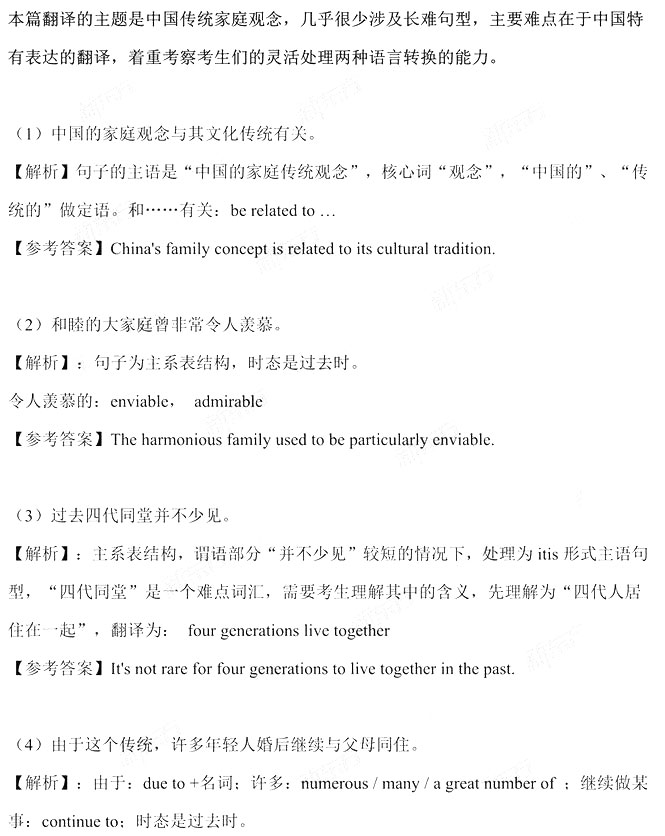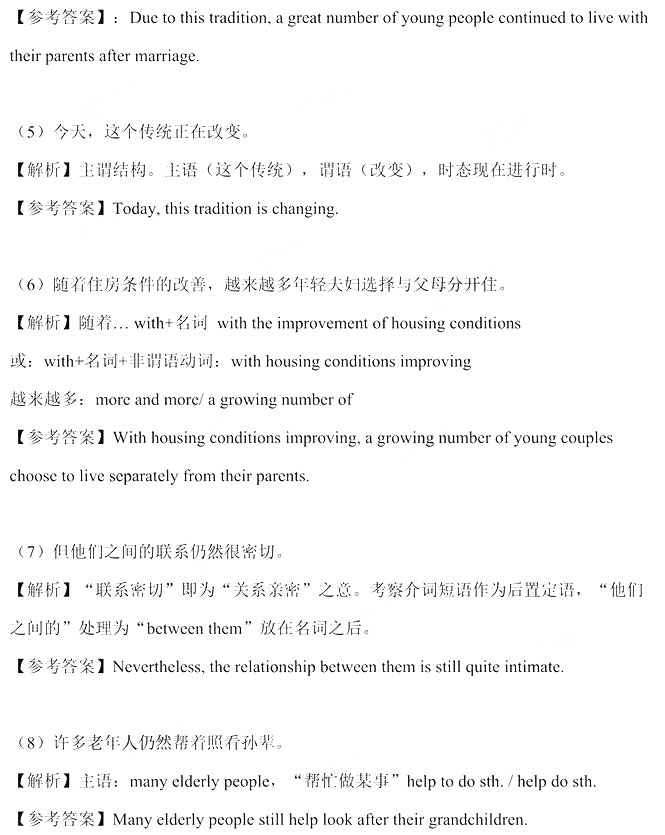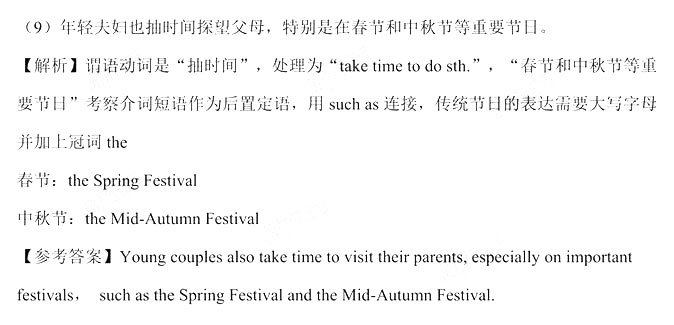【翻译原文】
中国的家庭观念与其文化传统有关。和睦的大家庭曾非常令人美慕。过去四代同堂并不少见。由于这个传统,许多年轻人婚后继续与父母同住。今天,这个传统正在改变。随着住房条件的改善,越来越多年轻夫妇选择与父母分开住。但他们之间的联系依然很密切。许多老年人仍然帮着照看孙辈。年轻夫妇也抽时间探望父母,特别是在春节和中秋节等重要节日。
【解析——考试吧版】
1.四世同堂
four generations under one roof four generations live together
过去四代同堂并不少见。
In the past, it was not uncommon to see a family of four generations living under one roof.
In the past, it was not uncommon to see four generations under one roof.
In the past, it was common to see that four generations live together.
2. 难句同意替换
和睦的大家庭曾非常令人羡慕。
A big harmonious family used to be quite enviable to many.
人们曾羡慕/渴望/希望拥有和睦的大家庭。
People used to wish for a big happy family.
本次翻译难度适中,其中卷二(家庭教育)难度偏低。
许多词在课堂上均出现过,如:春节(the Spring Festival)、中秋节(Mid-Autumn Festival)、繁荣(prosperity),汉字(Chinese characters)。由于/随着……,越来越多的……。 (With/As… a growing number of …)、不仅……而且……(not only…but also…)、……并不少见(It is not uncommon to see …)。
除此之外,一些难度较大的词也可以用到课上所讲的同义替换、解释等方法来处理:名牌大学(famous/renowned/reputable universities),承载(显示,表达等,show, convey),四代同堂(four generations live together)等。
其次,句型的处理方法也大多用到课上讲过的技巧处理。比如,长句往往可以截短进行翻译:“中文姓名的特点是,姓总是在前,名跟在其后,千百年来,父姓一直世代相传。”可以改写为“中文姓名的特点是,姓总是在前,名跟在其后。千百年来,父姓一直世代相传。” A feature in Chinese names is that people’s family names often come before their given names. For thousands of years, the father’s family names have been passed down through generations. 再比如,难句可同意替换后再翻译:“和睦的大家庭曾非常令人羡慕。”可以简化为“人们曾羡慕(或渴望/希望拥有)和睦(或快乐)的大家庭。”People used to wish to have a big happy family.
【逐句解析——文都版】
译句1 中国的家庭观念与其文化传统有关。
解析:该句中有明显的固定搭配,与...相关可用related to。
译文1 The concept of family in China is related to its cultural traditions.
译句2 和睦的大家庭曾非常令人美慕。
解析:该句基本可以采取顺译的方法,和睦的大家庭(The large and harmonious families),令人美慕(enviable)。翻译时可顺译该句子。
译文2 The large and harmonious families were once very enviable.
译句3 过去四代同堂并不少见。由于这个传统,许多年轻人婚后继续与父母同住。
解析:该句中应用到正反译法,并不少见,那就是说很常见,可直接翻译为very common.
译文3 The four generation family used to be very common, in the past.As a result of this tradition, many young people continue to live with their parents after marriage.
译句4 今天,这个传统正在改变。随着住房条件的改善,越来越多年轻夫妇选择与父母分开住。
解析:该句考查了with引导的伴随状语从句。
译文4 Today, the tradition is changing.With the improvement of housing conditions, An increasing number of young couples choose to live apart from their parents.
译句5 但他们之间的联系依然很密切。
解析:但他们之间的联系可以处理成后置定语,即But the connection between them.
译文5 But the connection between them remains strong.
译句6 许多老年人仍然帮着照看孙辈。
解析:本句较为简单,可采取顺译。
译文6 And many old people still have to look after their grandchildren.
译句7 年轻夫妇也抽时间探望父母,特别是在春节和中秋节等重要节日。
解析:抽时间探望父母,可以运用到习惯性表达:get around to visit their parents.
译文7 Young couples also get around to visit their parents,especially during the holidays, such as the Spring Festival and Mid-Autumn Festival.
【解析——新东方版】








四六级万题库 | 微信搜索"万题库英语四六级考试"




 英语四级
英语四级